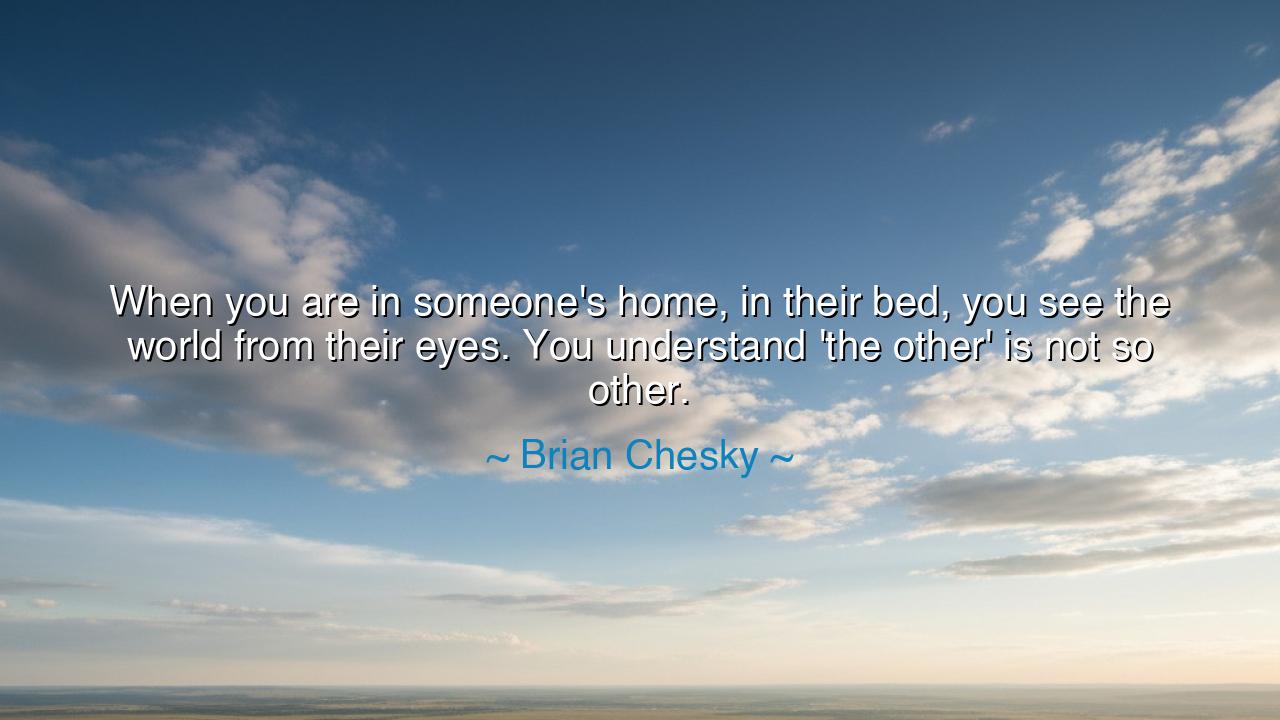
When you are in someone's home, in their bed, you see the world
When you are in someone's home, in their bed, you see the world from their eyes. You understand 'the other' is not so other.






In the luminous words of Brian Chesky, we find not merely a reflection on travel, but a revelation about the unity of humanity: “When you are in someone’s home, in their bed, you see the world from their eyes. You understand ‘the other’ is not so other.” This is no small thought — it is a philosophy of compassion wrapped in the language of experience. Chesky, the founder of Airbnb, speaks of what the ancients would call empathy, the sacred act of walking in another’s world. His words remind us that walls divide us not by nature, but by ignorance — that every doorway we enter with humility can become a gate to understanding.
To see the world from another’s eyes is to transcend the illusion of separateness. Since the dawn of civilization, humanity has built borders of tribe, race, faith, and nation, each claiming, “We are different.” But the wise have always known otherwise. The philosopher Marcus Aurelius wrote, “We are made for cooperation, like feet, like hands, like eyelids.” Chesky’s insight is a modern echo of that eternal truth: when we share space — not as tourists, but as guests — we dissolve the myth of “the other.” To sleep beneath another’s roof, to eat at their table, to breathe their air — these are sacred acts of communion, through which the stranger becomes kin.
The home is the temple of the soul. It is where our truest selves reside — our habits, our tenderness, our unguarded humanity. To be welcomed into someone’s home is to be invited into their heart. In ancient times, this was called xenia, the Greek law of sacred hospitality. To host a traveler was to honor the gods, for the stranger might be Zeus himself in disguise. And so, when Chesky speaks of sharing homes, he awakens that ancient virtue once more — that through hospitality, we return to the primal understanding that all humans are one family, scattered across many lands but bound by the same yearning for belonging.
Consider the story of Abraham, the patriarch of many faiths. When three strangers appeared before his tent, he bowed low, washed their feet, and offered bread and rest. Only afterward did he learn that these strangers were divine messengers. In his humility, he discovered a great truth: by opening our homes, we open the heavens. Every guest becomes a mirror in which we see the face of God — or, in Chesky’s modern phrasing, we discover that “the other is not so other.” The divine is found in the shared table, in the warmth of a bed offered freely, in the laughter of unfamiliar tongues that somehow speak to the same human heart.
Yet Chesky’s words carry another layer — a warning against the dehumanization of distance. In our age of digital walls and cultural division, we too easily forget that beyond every border lies a person who laughs, weeps, and dreams as we do. Technology can connect us across continents, but it can also numb us to the touch of real lives. When we live only behind screens, we risk losing the wisdom of proximity — the magic that occurs when we share space, when we smell the bread in another’s kitchen, when we learn the rhythm of a different dawn. Empathy cannot be downloaded; it must be lived.
The origin of this quote lies in Chesky’s own journey. As he built Airbnb, he realized that what people sought was not lodging, but connection. To stay in someone’s home is to step into their story — to see the photos on the wall, the wear on the furniture, the fingerprints of life. Through millions of such exchanges, strangers became friends, and the idea of “home” expanded beyond geography. This was more than business; it was a quiet revolution in perception — a rediscovery of what our ancestors once knew: that understanding begins where fear ends, and fear ends where human contact begins.
So let this be the teaching: open your door and open your heart. Seek not only to travel, but to dwell — to dwell for a time in another’s world, to let their truth reshape your own. Do not fear difference; approach it with curiosity, reverence, and kindness. When you meet a stranger, look for the reflection of yourself. For as the ancient sages and modern dreamers both teach, there are no true foreigners in this world — only brothers and sisters who have not yet shared bread.
Action to take: if you would know peace, practice hospitality. Visit the homes of others, and welcome them into yours. Listen to their stories without judgment. Sit at their tables. Sleep beneath roofs not your own, and learn to see the familiar through new eyes. For in doing so, you will come to understand the sacred truth of Chesky’s words — that humanity is not divided by walls, but united by windows. When you step through another’s doorway, you do not enter a stranger’s world — you return, at last, to your own.






AAdministratorAdministrator
Welcome, honored guests. Please leave a comment, we will respond soon